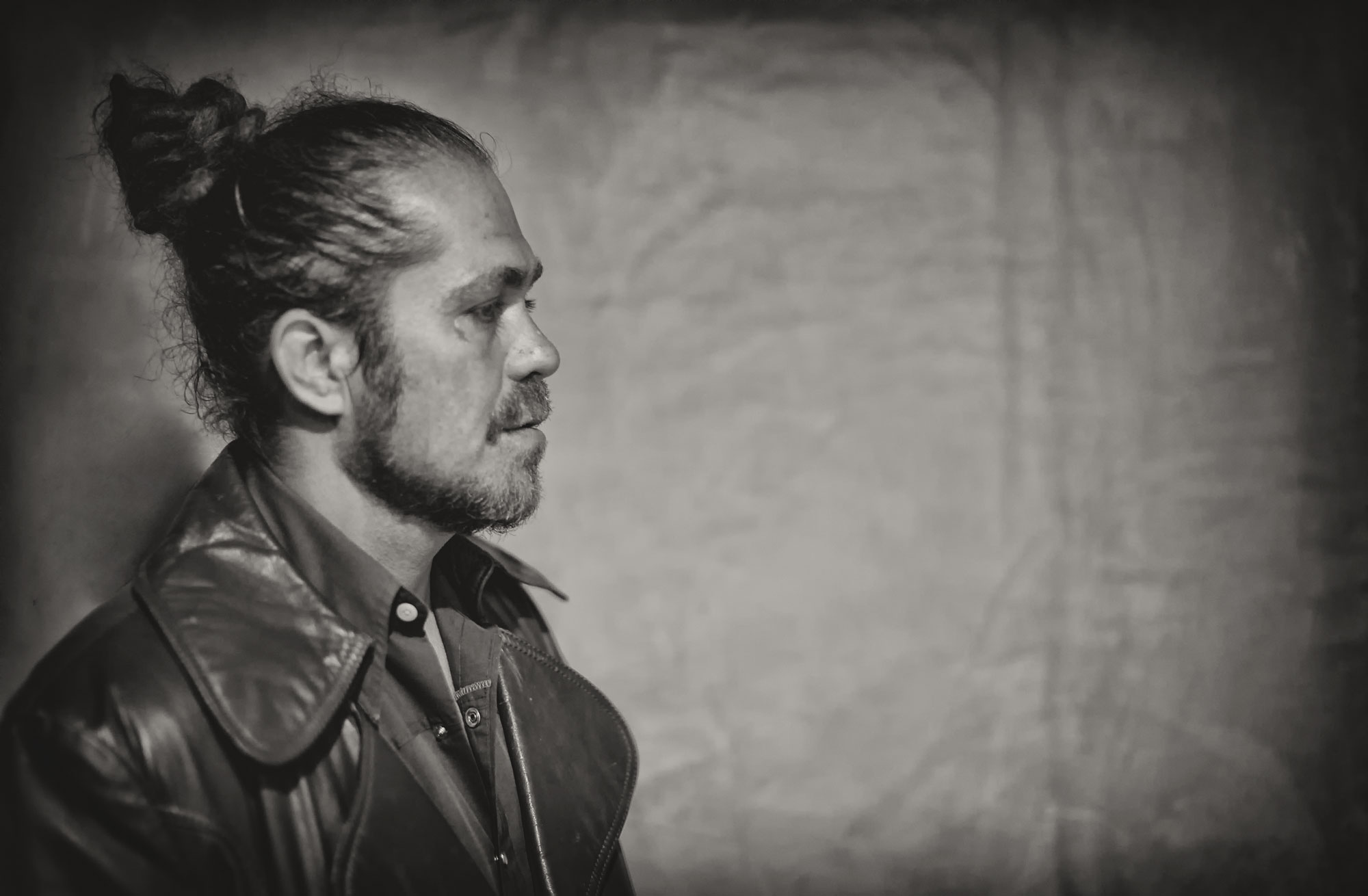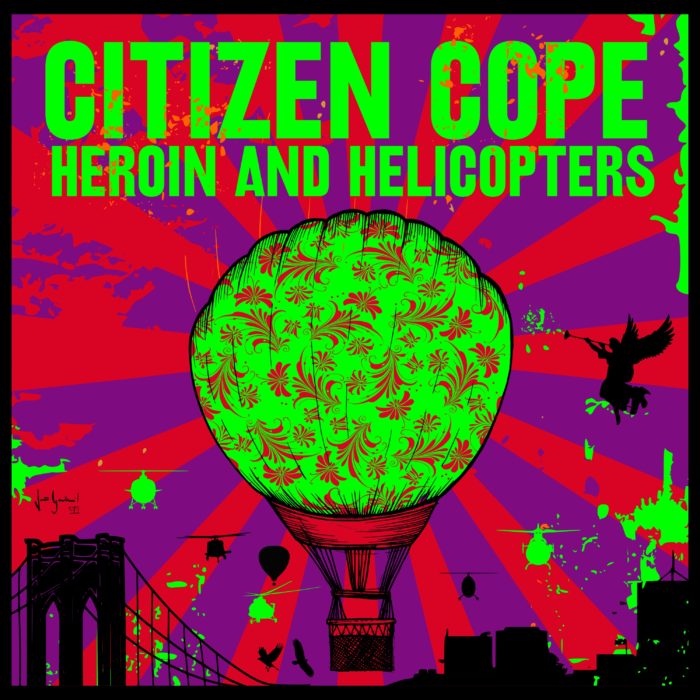Track By Track: Citizen Cope ‘Heroin and Helicopters’

The title of Heroin and Helicopters, Citizen Cope’s first studio effort since 2012’s One Lovely Day, was inspired by an admonition from Carlos Santana. Cope, whose given name is Clarence Greenwood, was performing in San Francisco, when he received those words of caution.
“I was at The Fillmore when Carlos was thinking of using ‘Sideways’ for his next album [2002’s Shaman],” he recalls. “Carlos came to meet me, and in the course of that conversation said, ‘You gotta watch out for the two H’s.’ I said, ‘What’s that?’ And told me: ‘Heroin and helicopters—they don’t mix well with musicians.’ He was talking about the helicopter crashes that took the lives of Bill Graham and Stevie Ray Vaughan, as well as opioids. It all made sense to me, so I never took a helicopter and never did heroin.
“Those ideas are just as important today,” Greenwood continues. “When I was making the record, I had a of couple friends lose loved ones to overdoses. It also became a theme at my shows where people would come back and say, ‘I was struggling and this record really helped me and saved my life.’ I really wasn’t aware what an epidemic it was. I had read about it and, even though I knew people who were suffering from it, I didn’t know how vast it was. It turns out that there were more than 70,000 deaths in 2017 due to drug overdoses. And the helicopter represents something that moves fast but isn’t very stable. It made me think of technology in general, and also our society’s inclination to hyper-speed into things that are indulgent, as opposed to things of quality. “I heeded his advice so it made sense to title the record after a conversation that meant so much to me and is still so important all these years later. It was a prophetic saying given the opioid crisis and the need to take the fast track into things that are inauthentic.
I see this decadence we’re all dealing with in our current society and the fact that addiction is so prevalent—whether we’re addicted to drugs or social media or phones or success or arguments or whatever it is that’s keeping us away from our spiritual destiny.”
“Duck Confit”
I wrote a number of poems that I’m going to put out in a book later this year. It’ll be sort of a scrapbook, like one of those mini-poetry books. I really like this poem and wanted to include it on the record.
When I write poems, they’re mostly stream of consciousness. I have never really performed my poems before; they’ve always remained written things. But I went in and put some music around this one and cut the song. Getting the rhythm of the poem and the music was a challenge, so I went over it a couple of times until I finally got the right pattern and everything. I cut that up at The Village in Los Angeles with XZ who worked on the record with me. The song is basically about how I was feeling about the current state of the world and my own life experiences.
“Justice”
“Justice” is a song I originally wrote for myself. Then it had some success in Europe with a popular artist named Ayo., who is Nigerian and German. She’s a very interesting woman with so much spirit. When I met her, I was like, “Hey, try this song” and she cut the record. I didn’t get to produce it, so I didn’t have much to do with the way it sounded.
It did pretty well in Europe but I wanted to do it my way. I think the chorus “our love will be received” is an important thing to say because, even if sometimes you don’t think what you’re putting out is being taken in, it will be taken in by someone at some point.
“Hours on End”
I cut the basics in D.C., at the old studio [Central Recordings] where I did “Bullet and a Target” and “Son’s Gonna Rise.” Then, I came back and did the overdubs in Los Angeles.
It explores the realization that we’re living in a time of argument and discontent. By doing that, we’re missing out on the chance to take in the moment and enjoy the natural things we have in life—what the earth gives to us. That includes relationships, the experience of feeling loved by someone else and feeling love yourself. You can’t buy those things.
“The River”
I was playing around with a riff in the house. I started singing it and my friend Syience came down and was like, “You gotta finish that.” I ended up finishing it that morning and we cut it that day.
I’m really proud of that piece. It’s a plea for us as humans to acknowledge pain of others. Then, in the second part, it’s about never wanting to lose faith in humanity, the system and the good in people. You can say you wouldn’t do something, but you don’t really know until you’re put in a difficult position. Somebody could say that they would never steal anything until they’re put in a position where they have to. Then it all just rises from there. How far are you going to let that go? Once you condition yourself to do something, it just keeps on going.
“War”
I created the hook in a Jamaican studio a long time ago for another artist but I’d always wanted to use it myself. So, I was playing around with it and tried it on a couple things; and then we cut it with XZ, who produced that song. It deals with the actual wars that people are having, but also the war inside our own minds. We have to come to peace in our own minds, as a collective, before all the outside world troubles are figured out.
“On My Love”
I thought about my daughter when I was writing it. People say, “I put it on my life!” But saying “on my love” really rings true with me. “I can tell you what I’ve learned, and that’s on my love.” It’s not a life or death saying; it’s what’s really closest to you.

“Caribbean Skies”
I got a call about doing a Christmas song for a movie. So I pulled up a drum beat that I recorded with Abe Laboriel Jr., added some 808s and played some chords to it. By then, it sounded so good I was like, “Nah, this is not going to be a Christmas song.”
It deals with the theme that we’re all on the same planet, the same universe. Wherever you are, you’re still under the same stars and same moon. We’re given this life and, even though we have separate struggles and traumas and exhilarating moments that happen in life, there is a connection to us all.
“Sally Walks”
I’ve been planning that song for a while. First, I had it on guitar, then I decided to add a piano thing, then I put Abe Laboriel Jr. underneath it to make the drums sound really big. It kind of deals with the struggles of addiction but not necessarily just that. It’s watching somebody you’ve loved take their own route—you knew them at some point, but they have changed. They don’t affect you in that way anymore; they aren’t a daily presence.
You don’t know who Sally is. Sally could be the person himself or his girlfriend or a drug or a bottle of liquor or a gambling chip. Sally is an analogy for somebody who has taken their own path leading to a destination that works for them but can’t work for all of us.
“Yella”
“Yella” feels like a country song to me. The visuals are of being in little league baseball, and it explains the cycle of life through the analogy of a baseball game—what “at bat” is like, and what striking out means. It is about how things take on this bright flame, whether it’s romance, love, or what we consider success. They become bright yellow things and it’s all fire but, eventually, that turns to ash, just like life. You know, “ashes to ashes, dust to dust.” So, loss sometimes means victory. Even though you might strike out, sometimes you face struggles—as we all do—that were meant to build your character.
The line “why does it end, the good times, when the good times just begin,” reminds me of when I was a child—I’d be playing kick the can with my friends or roughhousing with my siblings and, just as that came to its highest peak, it was time for dinner or time to go to sleep.
“Silver Bush”
“Silver Bush” is a song I did with Syience. I cut it in my house and I was just playing around with some stuff, just jamming on the song. Syience put some drums to it. I didn’t have a studio setup, so it was a very makeshift recording. I recorded the vocals and the guitar in one of my rooms, and ended up liking the way I stacked the vocals and did some chorus stuff.
“Forbidden”
I cut that a long time ago during the Clarence Greenwood Recordings sessions, just with guitar and vocal, but I didn’t use it. My engineer, Steef [Van De Gevel], put some crossfades on the vocal and it sounded really cool. It deals with someone who has met somebody who sees them the way they want to be seen—a downtrodden soul who found a person who has seen the good in them.
This article originally appears in the March 2019 issue of Relix. For more features, interviews, album reviews and more, subscribe here.



















